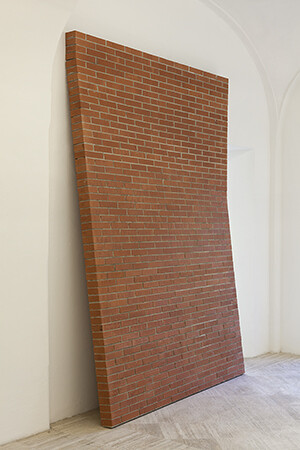Jackson, Kilian Rüthemann, Maaike Schoorel, David Schutter—Conversation Piece: Part 2
February 6–April 3, 2016
Fondazione Memmo – Contemporary Art
Via della Fontanella di Borghese, 56/B
Rome
Italy
artecontemporanea [at] fondazionememmo.it
Fondazione Memmo – Contemporary Art is proud to present Conversation Piece: Part 2, the second of a number of exhibitions dedicated to those artists currently residing in Rome, and scholars at foreign academies, cultural institutes, museums, foundations. The invited artists for this second edition are: Jackson, Kilian Rüthemann, Maaike Schoorel, and David Schutter.
The exhibition, curated by Marcello Smarrelli, was conceived with the aim of observing carefully and constantly reviewing what is happening in the contemporary art scene in Rome. A surprisingly active context, that of the contemporary art in the capital, difficult to perceive for the general public, but dominated by the continuous and crucial activity of the academies and foreign cultural institutes, where during several centuries new generations of artists from all over the world complete their education.
In choosing the title there was also a kind of cinematographic suggestion, inspired by one of the most famous films by Luchino Visconti, Conversation Piece (1974), which itself refers to a particular genre of painting, originally developed in the Netherlands, which represented a group of people in a domestic setting or engaged in genteel conversations. This exhibition, in fact, aims to be an opportunity for dialogue and relations with Rome and its ancient and contemporary history, but also represents a moment of discussion on the work of different artists, often very distant from each other for research, poetry, and techniques.
This year, artists have been asked to reflect on the concept of space and on how a work of art can converse with it, even giving it an interpretation and a definition that come to stray into the architecture field, highlighting the extreme fragility of the lines between disciplines. The pieces are all unedited and site specific, specially conceived and realized for the rooms of Palazzo Ruspoli.
The itinerary begins with David Schutter (1974), fellow at the American Academy, and his rendering of a mise-en-scène out of 17th Century Rome and forced into the present. The artist presents four paintings realized from his study of parlor-scale landscapes by Salvator Rosa and Gaspard Dughet in the Galleria Nationale D’Arte Antica di Palazzo Corsini. Made in his studio without the aid of memoirs, Schutter’s works are the result of a long visual engagement with paintings as a phenomenal source of perception. The particular display of these works is embodied in the exhibition through a design of like dimensions to the walls of the Palazzo Corsini where the Rosa and Dughet paintings are situated.
The installation of Jackson (1979), fellow at Accademia di Francia a Roma—Villa Medici, takes us in a space in which the sound shapes the physical nature of the visible spectrum. Musician, composer, and researcher, Jackson is interested in the hybridation of different mediums and languages. The piece, titled Brume Sonore #1, is a very evocative sculptural device made of glass, mist and metal that converts light waves in sound frequencies.
The work by Kilian Rüthemann (1979), fellow at the Istituto Svizzero, establishes a close dialogue between the space of the city and its genius loci, reflecting on an issue that runs through the history of architecture. The installation consists of four walls made of opus latericium with a particular reference to archetypical types of space, landscape, and ancient Roman architecture that introduce the use of bricks, still widespread today. Using different languages and materials, the artist reflects on the nature of shapes, industrial process, and on the relation with the viewer.
The exhibition ends with paintings by Maaike Schoorel (1973), fellow at the American Academy. Her pieces seem, at first sight, almost monochromatic, but as we get closer and closer we see a shred of landscape, a human presence or fragments of objects. At the entrance of the exhibition space there have been installed some plants to create a cross reference between the real space and that of her representations. This makes fluid the lines between reality and fiction, thus extending the exhibition space itself outside towards the city from which she gained inspiration.
In collaboration with The Embassy of the Kingdom of the Netherlands.
